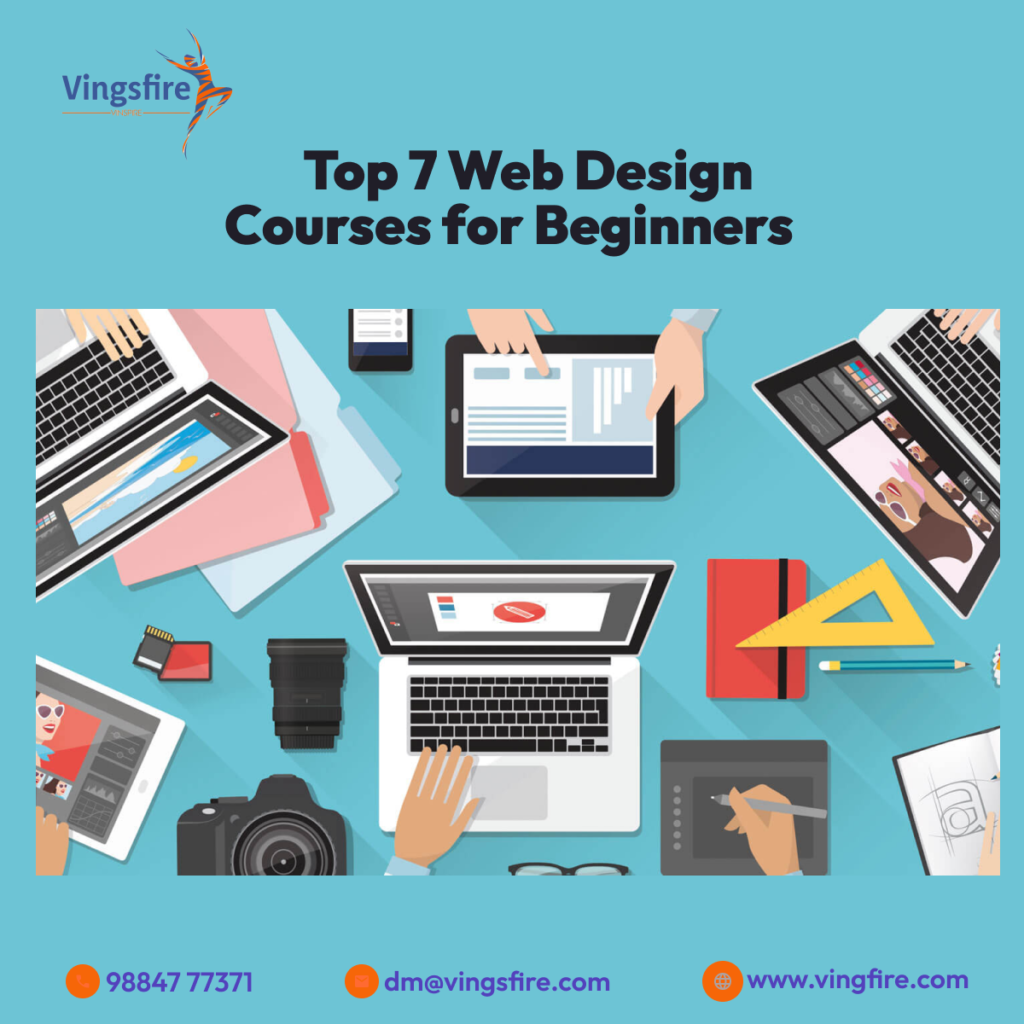
Introduction:
In the dynamic world of web design, mastering the fundamentals and staying updated with the latest trends and technologies is essential for success. Whether you’re a complete novice looking to embark on a new career path or a seasoned professional seeking to enhance your skills, enrolling in a web design course can provide you with the knowledge, tools, and techniques needed to create visually stunning and user-friendly websites. In this guide, we’ll explore the top 7 web design courses for beginners, each offering a comprehensive curriculum, expert instruction, and hands-on projects to help you kickstart your journey into the exciting world of web design.
1. HTML & CSS for Beginners:
HTML (Hypertext Markup Language) and CSS (Cascading Style Sheets) are the building blocks of web design, providing the foundation for creating and styling web pages. For beginners looking to learn the basics of web design, an introductory course in HTML and CSS is essential.
These courses typically cover topics such as HTML syntax and structure, CSS selectors and properties, layout techniques, and best practices for writing clean and maintainable code. By mastering HTML and CSS, beginners can gain a solid understanding of how web pages are structured and styled, laying the groundwork for more advanced topics in web design.
2. Responsive Web Design:
In today’s mobile-first world, designing websites that are responsive and accessible across devices is essential. A course in responsive web design teaches beginners how to create websites that adapt and respond to different screen sizes and devices, ensuring a seamless user experience for visitors on smartphones, tablets, and desktop computers.
These courses cover topics such as flexible layouts, media queries, viewport settings, and mobile-friendly design patterns. By learning responsive web design principles, beginners can create websites that look and function beautifully on any device, maximising reach and engagement.
3. JavaScript Fundamentals:
JavaScript is a powerful programming language that adds interactivity and dynamic functionality to websites. For beginners looking to add depth and interactivity to their web design skills, a course in JavaScript fundamentals is essential. These courses cover topics such as variables, data types, operators, control structures, functions, and DOM manipulation.
Additionally, beginners will learn how to use JavaScript libraries and frameworks such as jQuery and React to streamline development and enhance user experience. By mastering JavaScript fundamentals, beginners can create interactive and engaging websites that captivate and delight visitors.
4.UX/UI Design Principles:
User experience (UX) and user interface (UI) design are integral components of effective web design, focusing on creating intuitive, user-friendly, and visually appealing interfaces. For beginners interested in learning the principles of UX/UI design, a dedicated course in UX/UI design is invaluable. These courses cover topics such as user research, wire framing, prototyping, usability testing, and visual design principles.
Additionally, beginners will learn how to use design tools such as Sketch, Adobe XD, and Figma to create high-fidelity prototypes and mockups. By mastering UX/UI design principles, beginners can create websites that prioritise user needs and deliver exceptional experiences.
5.Adobe Photoshop for Web Design:
Adobe Photoshop is a powerful tool for creating and editing graphics, images, and visual assets for web design projects. For beginners looking to enhance their graphic design skills and create stunning visuals for websites, a course in Adobe Photoshop for web design is essential. These courses cover topics such as image editing, photo manipulation, layer management, typography, and color theory.
Additionally, beginners will learn how to create web-ready graphics and optimize images for the web. By mastering Adobe Photoshop, beginners can create visually stunning and professionally polished designs that elevate their web projects.
6.WordPress Web Design:
WordPress is the most popular content management system (CMS) for building websites, powering millions of websites across the globe. For beginners looking to create websites quickly and efficiently, a course in WordPress web design is indispensable. These courses cover topics such as WordPress installation and setup, theme customisation, plugin integration, and content management.
Additionally, beginners will learn how to create custom themes and templates, optimize websites for search engines, and implement e-commerce functionality. By mastering WordPress web design, beginners can create professional-looking websites with ease and confidence.
7.Introduction to Web Design:
For absolute beginners looking to gain a comprehensive understanding of web design principles and practices, an introductory course in web design is the perfect starting point. These courses provide a broad overview of the web design process, covering topics such as design principles, typography, color theory, layout techniques, and workflow best practices.
Additionally, beginners will learn how to use design tools such as Adobe XD, Sketch, or Sigma to create wireframes and mockups, as well as how to collaborate with clients and stakeholders throughout the design process. By completing an introduction to web design course, beginners can gain a solid foundation in web design fundamentals and prepare themselves for further specialisation in specific areas of interest.
Conclusion:
Embarking on a journey into the world of web design can be both exciting and challenging for beginners. However, by enrolling in one or more of the top 7 web design courses outlined in this guide, beginners can acquire the knowledge, skills, and confidence needed to create visually stunning and user-friendly websites. Whether you’re interested in mastering HTML and CSS, learning JavaScript programming, delving into UX/UI design principles, or mastering WordPress web design, there’s a course available to help you achieve your goals. With expert instruction, hands-on projects, and real-world applications, these courses offer a comprehensive and immersive learning experience that empowers beginners to succeed in the dynamic and competitive field of web design.
